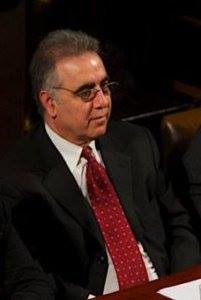On the occasion of the Armenian Genocide Centennial, Turkish reporters insistently inquired about Armenia’s territorial claims from Turkey.
In an interview published on April 25, 2015, in the Turkish Hurriyet newspaper, a reporter asked Pres. Serzh Sargsyan if Armenia had territorial demands from Turkey. Below is my translation of Hurriyet’s Turkish text of Pres. Sargsyan’s response:
“Since its independence, the Republic of Armenia has not had any territorial claims from Turkey or any other country. Our government’s foreign policy agenda has not had such an issue, and does not have it today. This is clear. We are a full and responsible member of the international community. As a UN member state, we understand our role in the international community; we respect the principles of international law.… If you pay close attention, Armenia’s demands for land from Turkey are discussed in Turkey, not in Armenia! As to why this is so, I let everyone draw their own conclusions.”
During a meeting with representatives of the Armenian-American community on May 7 in Washington, DC, I asked Pres. Sargsyan to clarify his comments to Hurriyet which were misunderstood or misinterpreted by some Armenians and Turks. The President explained that he had not said that Armenia did not have territorial demands from Turkey. He had simply stated that Armenia did not present such demands, and added: “We have no right to say that we have no territorial demands from Turkey. We also have no right to say that we have such demands.” The President went on to say that “Armenian political parties in the Diaspora are free to present such demands.”
Pres. Sargsyan is clearly indicating that as a head of state, demanding land from Turkey — a powerful and menacing neighbor — could have serious consequences on Armenia’s national security, which is not the case when such claims are made by individuals or organizations.
Earlier that same day, the morning of May 7, during Foreign Minister Edward Nalbandian’s press conference at the National Press Club in Washington, DC, another Turkish journalist asked the same question about Armenian territorial claims from Turkey. Nalbandian gave the same answer as the President: “Armenia has not made territorial claims from Turkey.” He also wondered why is this issue raised in Ankara rather than Yerevan?
Four years ago, on July 23, 2011, Pres. Sargsyan gave a firmer answer when an Armenian student asked him about the eventual return of Mount Ararat and Western Armenia:
“It all depends on you and your generation. I believe my generation fulfilled its task when it was necessary in the early 1990’s to defend a part of our homeland — Karabagh — from enemies. We were able to do that…. My point is that each generation has its own task, and it must be able to carry it out, and carry it out well.”
The Armenian President’s answer created a huge storm of controversy in Turkey and Azerbaijan. Journalists and officials in both countries mounted hysterical attacks on Armenia, accusing Pres. Sargsyan of “urging Armenian youth to occupy Mt. Ararat and Eastern Turkey.” Insulting adjectives were hurled at Pres. Sargsyan by Turkey’s then Prime Minister Erdogan, Deputy Prime Minister Bulent Arinc, Minister Egemen Bagis, Pres. Ilham Aliyev of Azerbaijan, and the Foreign Ministries of both countries. Erdogan even demanded an apology from Armenia’s President. To incite the masses, protests were organized in Turkish cities where photographs of Pres. Sargsyan were burned!
It is understandable why Turkish leaders are so apprehensive when the issue of Armenian territorial demands is raised. Knowing full well that their ancestors eliminated the Armenian population from their native lands, Turkish officials are haunted by the fear that Armenians would reclaim their historic homeland of Western Armenia, today’s Eastern Turkey!
In order to unite Armenians around the same set of demands, I believe we should adopt the slogan — “seeking justice” — which includes all Armenian claims from Turkey as expressed in the Pan-Armenian Declaration of the Armenian Genocide Centennial adopted in Yerevan on January 29, 2015, by the governments of Armenia and Artsakh, and leaders of major Diasporan organizations. Paragraph 6 of that Declaration calls for “restoring individual, communal and pan-Armenian rights and legitimate interests.” Furthermore, the Declaration’s preamble specifically mentions “the dispossession of the Homeland,” the Treaty of Sevres of August 10, 1920, and Pres. Woodrow Wilson’s Arbitral Award of Nov. 22, 1920, which granted Armenia a territory several times larger than today’s Armenian Republic.


